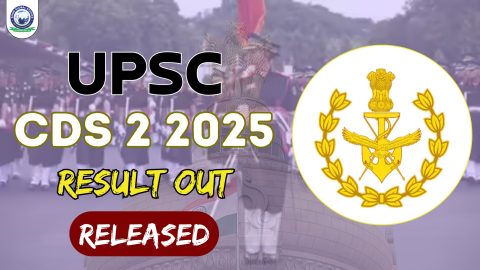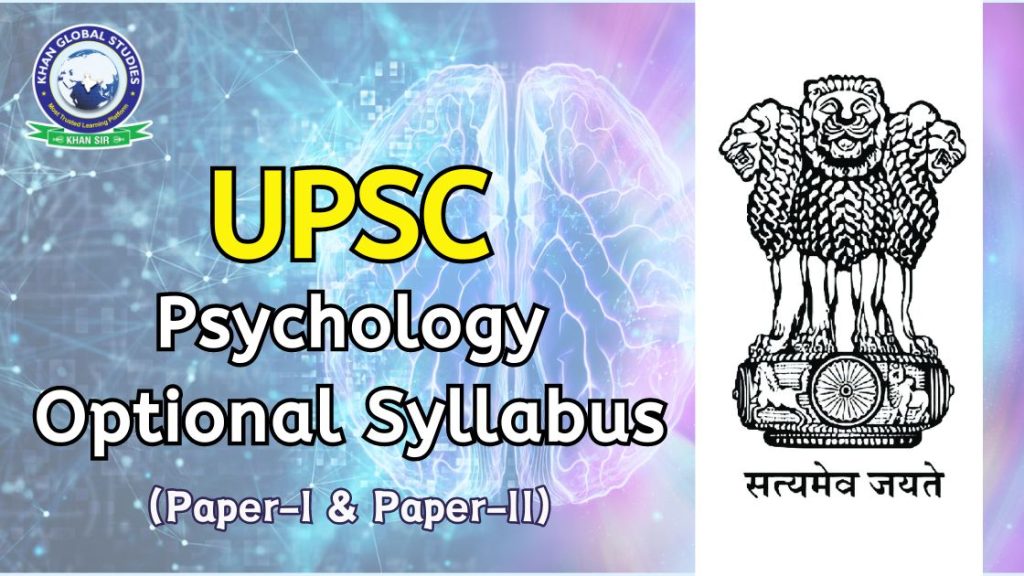UPSC offers Psychology as an optional subject for the Main Civil Services Examination. Psychology is the study of the human brain and its processes, particularly how they influence behaviour in various situations. It is considered a social science, a natural science and a subject in the field of life sciences. UPSC Psychology Optional syllabus covers a wide range of subjects including Methods of Psychology, Attention and Perception, Learning, Memory, etc.
Psychology is an exciting subject that requires a well-planned strategy to excel in the UPSC exam. There are two papers for Psychology optional subject in UPSC Mains. Each paper has 250 marks, so the total marks for the Psychology optional subject is 500.
UPSC Psychology Optional Syllabus
Psychology is a fascinating subject that focuses on training the brain to understand and analyze human behaviour. Studying psychology can benefit both personal and professional aspects of life.
| UPSC Psychology Syllabus | Topics |
| Psychology Optional Syllabus for UPSC Paper 1 | Methods of Psychology Research Methods Development of Human Behaviour, Sensation Attention and Perception Learning Memory, etc |
| Psychology Optional Syllabus for UPSC Paper 2 | Psychological Measurement of Individual Differences Psychological Well-being and Mental Disorders Therapeutic Approaches Work Psychology and Organizational Behavior Application of Psychology to the Educational Field Community Psychology |
UPSC Psychology Optional Syllabus Paper 1
Introduction
- Definition of psychology; Historical antecedents and trends of psychology in the 21st century
- Psychology and Scientific Methods; Psychology to other social sciences and natural sciences
- Application of psychology to social problems
Methods of Psychology
- Types of Research: Descriptive, Evaluative, Diagnostic and Prognostic
- Research methods: survey, observation, case study and experiment; Characteristics of experimental design and non-experimental design
- Quasi-experimental design; Focus group discussion, brainstorming, grounded theory approach.
Research Methods
- Major Steps in Psychological Research (Problem Statement, Hypothesis Formulation, Research Design, Sampling, Instruments of Data Collection, Analysis and Interpretation, and Report Writing)
- fundamental versus applied research; Data collection methods (interviews, observations, questionnaires)
- Research Design (retrospective and experimental); Application of statistical techniques (t-test, two-way ANOVA correlation).
- Regression and factor analysis; item response theory
Evolution of Human Behavior
- Growth and Development; Theory of evolution, the role of genetic and environmental factors in determining human behaviour.
- Influence of cultural factors in socialization; Life span development – characteristics, developmental tasks.
- Promoting psychological well-being across key stages of the lifespan
Cognition, Attention and Perception
- Sensitivity: Concepts of threshold, absolute and differential limits, signal-detection and vigilance.
- Factors affecting attention include the set and characteristics of the stimulus, definition and concept of perception, biological factors in perception
- Perceptual organization effects of previous experiences, perceptual defence factors affecting space and depth perception, size estimation, and perceptual preparation.
- plasticity of perception; extrasensory perception; Culture and perception, unconscious perception
Learning
- Concepts and theories of learning (behaviourist, Gestaltist and Information processing models)
- the processes of extinction, differentiation and generalization; Programmed Learning, Probabilistic Learning, Self-Instructional Learning, Concepts
- Types and programs of reinforcement, escape, avoidance and punishment, modeling and social learning
Memory
- Encoding and Remembering; Short-term memory, long-term memory, sensory memory, iconic memory
- Echoic Memory: multistore model, levels of processing
- Organization and Mnemonic techniques to improve memory
- Theories of Forgetting: Decay, Interference, and Retrieval Failure: Metamemory; Amnesia: anterograde and retrograde
Thinking and Problem-Solving
- Piaget’s Theory of Cognitive Development, concept formation processes, information processing
- Reasoning and problem-solving, facilitating and hindering problem-solving
- Problem-Solving Methods: Promoting Creative Thinking and Creativity
- Decision making and factors influencing decisions; recent trends
Inspiration and Emotion
- The psychological and physiological basis of motivation and emotion; Measuring Motivation and Emotion
- The influence of motivation and emotion on behaviour; external and internal motivation
- Factors affecting intrinsic motivation, emotional competence and related issues
Intelligence and Ability
- Concepts of intelligence and ability, nature and theories of intelligence – Spearman, Thurston, Guilford Vernon, Sternberg, and J.P.; Slave
- Measurement of Emotional Intelligence, Social Intelligence, Intelligence and Aptitude
- Concept of IQ, Deviant IQ, Stability of IQ; measurement of multiple intelligences
- fluid intelligence and crystallized intelligence
Personality
- Definition and concept of personality; Theories of personality (psychoanalytic, socio-cultural, interpersonal
- Developmental, Humanistic, Behavioral, Trait and Type Approach)
- Measurement of personality (projective tests, pencil-paper tests); Indian perspective towards personality
- Training for personality development; Recent approaches such as the Big 5-Factor Theory
- Perception of self in different traditions
Attitudes, Values and Interests
- Definition of Attitudes, values and interests; Components of approach; Building and Maintaining Attitudes
- Measurement of attitudes, values, and interests; Theories of attitude change; Strategies to Promote Values
- Formation of stereotypes and prejudices; changing the behaviour of others
- Principles of Attribution; Recent trends
Language and Communication
- Human Language – Properties, Structure and Linguistic Hierarchy
- Language acquisition-predisposition, critical period hypothesis; principles of language development
- Skinner and Chomsky; Process and types of communication: effective communication training
Issues and Perspectives in Modern Contemporary Psychology
- Computer Applications in psychological laboratory and psychological testing
- Artificial Intelligence; Psychocybernetics; Study of consciousness – sleep-wake schedule; Dreams, excitement, meditation, hypnosis/narcotic induced states
- Extrasensory Perception; Intersensory Perception Simulation Study
UPSC Psychology Optional Course Paper 2
Psychological Measurement of Individual Differences
- Nature of individual differences; Features and construction of standardized psychological tests
- Types of psychological tests; Uses, misuses and limitations of psychological tests
- Ethical Issues in the Use of Psychological Tests
Psychological Well-being and Mental Disorders
- Concept of health-ill-health; positive health, happiness
- Factors causing mental disorders (anxiety disorders, mood disorders, schizophrenia and delusional disorders; personality disorders, substance abuse disorders)
- Factors influencing positive health, well-being, lifestyle and quality of life; happy nature
Therapeutic Approach
- Psychodynamic therapy, behaviour therapy; client-centred therapy
- Cognitive therapy; indigenous remedies (yoga, meditation); biofeedback therapy
- Prevention and rehabilitation of the mentally ill; promote mental health
Work Psychology and Organizational Behavior
- Personnel Selection and Training; Use of psychological tests in industry; Training and Human Resource Development; Theories of Work Motivation – Herzberg, Maslow, Adam Equity Theory, Porter and Lawler, Vroom; Leadership and Partnership Management; Advertising & Marketing; Stress and Its Management; Ergonomics; Consumer Psychology; Management Effectiveness; transformational leadership; Sensitivity Training; Power and politics in organizations
Application of Psychology in the Educational field
- Psychological principles underlying effective teaching-learning process
- Learning Styles; Gifted, mentally retarded, learning disabled and their training
- Training to improve memory and academic achievement
- Personality Development and Values Education, Educational, Vocational Guidance and Career Counselling.
- The use of psychological tests in educational institutions; Effective strategies in guidance programs
Community Psychology
- Definition and Concepts of Community Psychology; use of small groups in social activity
- Raising community awareness and taking action to tackle social problems
- Group decision-making and leading for social change; effective strategies for social change
Rehabilitation Psychology
- Primary, Secondary and Tertiary Prevention Programs – Role of Psychologists
- Organization of services for the rehabilitation of physically, mentally and socially handicapped people including old persons.
- Rehabilitation of persons suffering from drug abuse, juvenile delinquency, and criminal behaviour
- Rehabilitation of victims of violence, rehabilitation of HIV/AIDS victims, the role of social agencies.
Application of Psychology to Disadvantaged Groups
- Deprivation, concept of deprivation, social, physical, cultural and economic consequences of deprivation and deprived groups.
- Educating the underprivileged and motivating them for development
- relative and prolonged deprivation
Psychological Problems of Social Integration
- Concept of social integration; Problem of conflict and prejudice of caste, class, religion and language
- The nature and expression of prejudice between in-group and out-group
- Factors causing social conflict and prejudice; Psychological strategies for dealing with conflicts and prejudices
- Ways to achieve social unity.
Application of Psychology in Information Technology and Mass Media
- Current scenario of information technology and boom in mass media and role of psychologists
- Selection and training of psychology professionals to work in IT and mass media.
- Distance education through IT and mass media; Entrepreneurship through e-commerce
- Multi-level Marketing; Impact of TV and value addition through IT and mass media
- Psychological implications of recent developments in information technology
Psychology and Economic Development
- Achievement Motivation and Economic Growth; Characteristics of Entrepreneurial Behavior
- To motivate and train people for entrepreneurship and economic development
- Consumer Rights and Consumer Awareness
- Government policies to promote entrepreneurship among youth including women entrepreneurs
Application of Psychology in Environment and Related Fields
- Environmental Psychology-Effect of Noise, Pollution and Crowds
- Population Psychology: Psychological Consequences of Population Explosion and High Population Density
- To inspire the ideal of the small family; Impact of rapid scientific and technological development on environmental degradation
Application of Psychology in other fields
- Military Psychology
- Preparation of psychological tests for defence personnel for use in the selection
- training, consultation; Training psychologists to work with defence personnel to promote positive health
- Human Engineering in Defense
- Sports Psychology provides interventions to improve the performance of athletes and sports. Individuals participating in individual and team sports
- Media influences pro-social and anti-social behaviour.
- Psychology of Terrorism
Psychology of Gender
- Discrimination issues, management of diversity, glass ceiling effect
- Self-evident Prophecy, Women and Indian Society
Tips to Prepare Psychology Syllabus for UPSC 2024
- Understand the syllabus: Start by understanding the UPSC Psychology optional syllabus thoroughly. Familiarize yourself with the various topics and sub-topics mentioned in the syllabus. This will help you make a structured study plan.
- Study Basics: Start by building a strong foundation in psychology. Understand the basic concepts, principles and theories of the subject. Start with topics like foundations of psychology, research methods, and psychological theories.
- Practice Answer Writing: Answer writing is important for the UPSC exam. Regularly practice writing answers to previous year’s question papers and mock tests. Concentrate on presenting your ideas logically and structuring your answers effectively.
- Analyze Case Studies: Psychology often involves analyzing case studies. Practice analyzing and explaining case studies to enhance your critical thinking and problem-solving skills. Focus on identifying relevant psychological theories and applying them to practical situations.
- Stay Updated: Keep yourself updated with the recent developments and contemporary issues in the field of psychology. Remain informed about new research findings, emerging trends and current debates. This will help you to provide relevant and updated answers in the exam.



